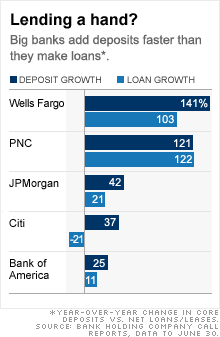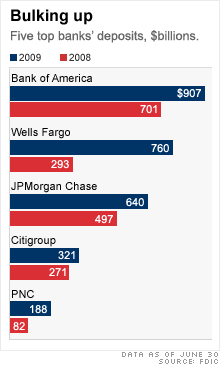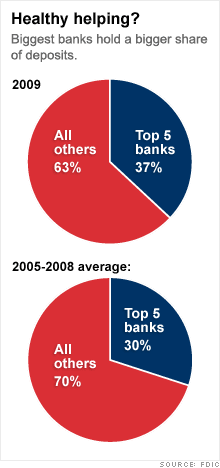Big banks take your money and run
The titans that survived last year's tumult have gathered deposits by the bushel. But they have shown less of a knack for lending it out.



NEW YORK (Fortune) -- A river of cash has flowed into the biggest banks over the past year. But for borrowers, it has been more of a meandering stream.
Deposits at the top five bank holding companies soared 29% in the year ended June 30, according to the Federal Deposit Insurance Corp.
Yet only one of those banks -- PNC (PNC, Fortune 500) of Pittsburgh -- boosted its lending by the same magnitude, according to midyear data from regulatory filings.
At Bank of America (BAC, Fortune 500), JPMorgan Chase (JPM, Fortune 500) and Wells Fargo (WFC, Fortune 500), loan growth trailed deposit growth by a wide margin.
And Citigroup (C, Fortune 500), the bank that has received the most federal aid since the market meltdown of September 2008, reported a decrease in lending despite an increasing pool of deposits.
All told, the five biggest deposit-taking banks added $852 billion in core deposits over the past year -- essentially checking and savings accounts of less than $100,000.
Over the same period, their loan portfolios rose by just $564 billion.
This is noteworthy because these five banks received more than $100 billion in direct taxpayer assistance via the Troubled Asset Relief Program (TARP) -- a program that was set up to replenish the depleted capital levels of banks and allow them to boost lending to consumers and small businesses.
Some fear the lending gap could hamper chances of an economic recovery.
Federal Reserve governor Daniel Tarullo told Congress this month that commercial bank lending has declined through most of 2009, "with particularly severe consequences for small- and medium-sized businesses, which are much more dependent on banks than on the public capital markets that can be accessed by larger corporations."
Of course, the slower loan growth is hardly a shocker. Loan demand naturally drops off during a recession, as consumers and businesses pay down debt and build cash reserves.
The latest Fed senior loan officer opinion survey cited weaker demand for all sorts of loans -- particularly industrial loans and commercial real estate loans.
JPMorgan Chase spokesman Tom Kelly said that's why the bank's loan growth lagged its deposit growth.
"We continue to lend, but what happened in the market and the economy last year really spooked a lot of people. So they started parking cash at banks," he said.
Banks have also been reluctant to lend since they have been taking big hits as existing loans go sour as well.
Commercial net loan charge-offs hit 2.06% in the second quarter -- their highest level since the government started tracking the data in 1988, according to the Federal Financial Institutions Examination Council.
Still, evidence that the banks are sitting on cash won't sit well with the growing chorus of bailout critics.
Big banks have come under fire for resisting plans to reduce the risk of another financial sector meltdown and for handing out huge pay packages at a time when jobs are disappearing.
Last week's disclosure that Goldman Sachs (GS, Fortune 500) has set aside $16.7 billion for employee pay this year inflamed critics who question why bankers should reap the fruits of unlimited taxpayer support while the unemployment rate is at a 26-year high.
Many of the deposit gains came after big banks took over weakened competitors during last year's crisis.
JPMorgan Chase bought Washington Mutual after the Seattle-based savings and loan became the nation's largest bank failure.
Bank of America bought Countrywide and Merrill Lynch, both of which owned banks that were among the top 20 in deposits before their acquisition. BofA didn't immediately return a call seeking comment.
Wells Fargo and PNC both bulked up by buying bigger but deeply troubled rivals. Wells acquired Wachovia after it suffered a deposit run, while PNC purchased National City after its request for TARP funding was denied. PNC didn't comment.
"We are in fact lending to creditworthy customers," said Wells spokeswoman Julia Tunis Bernard. She said Wells extended $471 billion in new loan commitments between October 2008 and the end of the second quarter -- some 19 times the bank's TARP take.
Even Citi, which sat out last fall's frenzied game of banking musical chairs, still posted double-digit deposit growth as Americans fled other investments for the safety of federally insured banks. Citi didn't reply to a request for comment.
The top five firms -- dubbed too-big-to-fail, or TBTF, for their implicit government support -- now control 37% of the nation's deposits.
That's well above their average from earlier this decade, reviving questions about the risks of a financial system that's even more concentrated than the one that imploded last fall.
"The TBTF problem has not only moved beyond the banking system, it has become much too costly for taxpayers and the U.S. economy," University of Massachusetts researcher Jane D'Arista wrote in an August paper. ![]()
-
 The retail giant tops the Fortune 500 for the second year in a row. Who else made the list? More
The retail giant tops the Fortune 500 for the second year in a row. Who else made the list? More -
 This group of companies is all about social networking to connect with their customers. More
This group of companies is all about social networking to connect with their customers. More -
 The fight over the cholesterol medication is keeping a generic version from hitting the market. More
The fight over the cholesterol medication is keeping a generic version from hitting the market. More -
 Bin Laden may be dead, but the terrorist group he led doesn't need his money. More
Bin Laden may be dead, but the terrorist group he led doesn't need his money. More -
 U.S. real estate might be a mess, but in other parts of the world, home prices are jumping. More
U.S. real estate might be a mess, but in other parts of the world, home prices are jumping. More -
 Libya's output is a fraction of global production, but it's crucial to the nation's economy. More
Libya's output is a fraction of global production, but it's crucial to the nation's economy. More -
 Once rates start to rise, things could get ugly fast for our neighbors to the north. More
Once rates start to rise, things could get ugly fast for our neighbors to the north. More







